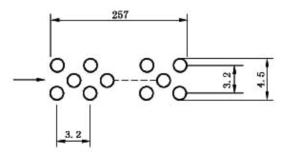universal tensile tester machine
The Universal Tensile Tester A Key Instrument in Material Testing
In the world of material science and engineering, understanding the mechanical properties of materials is crucial for design, quality control, and research. One of the most important tools used in this field is the universal tensile testing machine. This sophisticated device plays an essential role in evaluating the tensile strength, yield strength, elongation, and reduction of area of various materials, including metals, plastics, and composites.
What is a Universal Tensile Tester?
A universal tensile tester, often referred to simply as a tensile testing machine, is designed to apply a uniaxial tensile force to a specimen until failure occurs. The machine is equipped with two grips one fixed and one movable. The specimen is mounted between these grips, and as the machine operates, the movable grip pulls the specimen apart at a controlled rate. The key parameters measured during this testing process include the force applied to the specimen and the amount of elongation.
Importance of Tensile Testing
Tensile testing is integral to numerous industries, including construction, aerospace, automotive, and manufacturing. By understanding how materials respond to stress, engineers can predict how they will behave under real-world conditions. This knowledge is vital for ensuring safety and reliability. For instance, in the aerospace sector, materials must withstand high stress and fatigue over time, and tensile testing provides data that informs material selection for critical components.
Key Features of Universal Tensile Testers
universal tensile tester machine

Modern universal tensile testers are equipped with a variety of features to enhance their functionality. For instance, many machines utilize advanced load cells to provide accurate force measurements. They often come with extensometers for precise elongation measurements. Additionally, some testers can operate at varying temperatures and environmental conditions, allowing for the evaluation of materials in scenarios that mimic actual usage.
Most universal tensile testers are also computer-controlled, offering seamless integration with software that helps in data collection and analysis. This capability allows engineers to generate detailed reports and visually represents test results through graphs, such as stress-strain curves. Such curves reveal critical material properties, including elastic modulus, yield point, and ultimate tensile strength, in a single graphical representation.
Applications Across Industries
Across various sectors, the universal tensile tester is utilized for multiple applications. In the automotive industry, for instance, tensile testing helps assess the strength of materials used in vehicle components—ensuring they can withstand operational stresses and contribute to overall vehicle safety. In the construction industry, tensile testing is vital for evaluating steel beams and other structural components to ensure they meet necessary safety standards.
In the realm of polymers, these machines assess the performance of plastic products under tensile loads, which is crucial for industries that produce everything from packaging materials to high-performance automotive parts. Moreover, composites, which combine two or more materials to improve strength and reduce weight, require tensile testing to understand their unique properties.
Conclusion
In summary, the universal tensile tester is an indispensable tool in the field of material testing, providing critical data that influences material selection and design. Its ability to accurately measure the mechanical properties of materials makes it fundamental to ensuring safety, performance, and reliability across various industries. As technology advances, we can expect these machines to become even more precise and versatile, further enhancing our understanding of materials and leading to innovations in engineering and design.
-
QNJ-2/3 Cable Flexibility Test Machine: Precision & Durability
NewsAug.31,2025
-
DQ-F Superfine Wire Conductor Resistance Fixture: High-Precision Testing
NewsAug.30,2025
-
ZC36 High Insulation Resistance: Reliable & Safe Performance
NewsAug.29,2025
-
CX-100 Manual Hydraulic Core Punching Machine - Efficient & Reliable
NewsAug.28,2025
-
Reliable Performance Testing with Advanced Aging Chamber Solutions
NewsAug.23,2025
-
Advancing Precision with Profile Projector Technology
NewsAug.23,2025
 Copyright © 2025 Hebei Fangyuan Instrument & Equipment Co.,Ltd. All Rights Reserved. Sitemap | Privacy Policy
Copyright © 2025 Hebei Fangyuan Instrument & Equipment Co.,Ltd. All Rights Reserved. Sitemap | Privacy Policy

